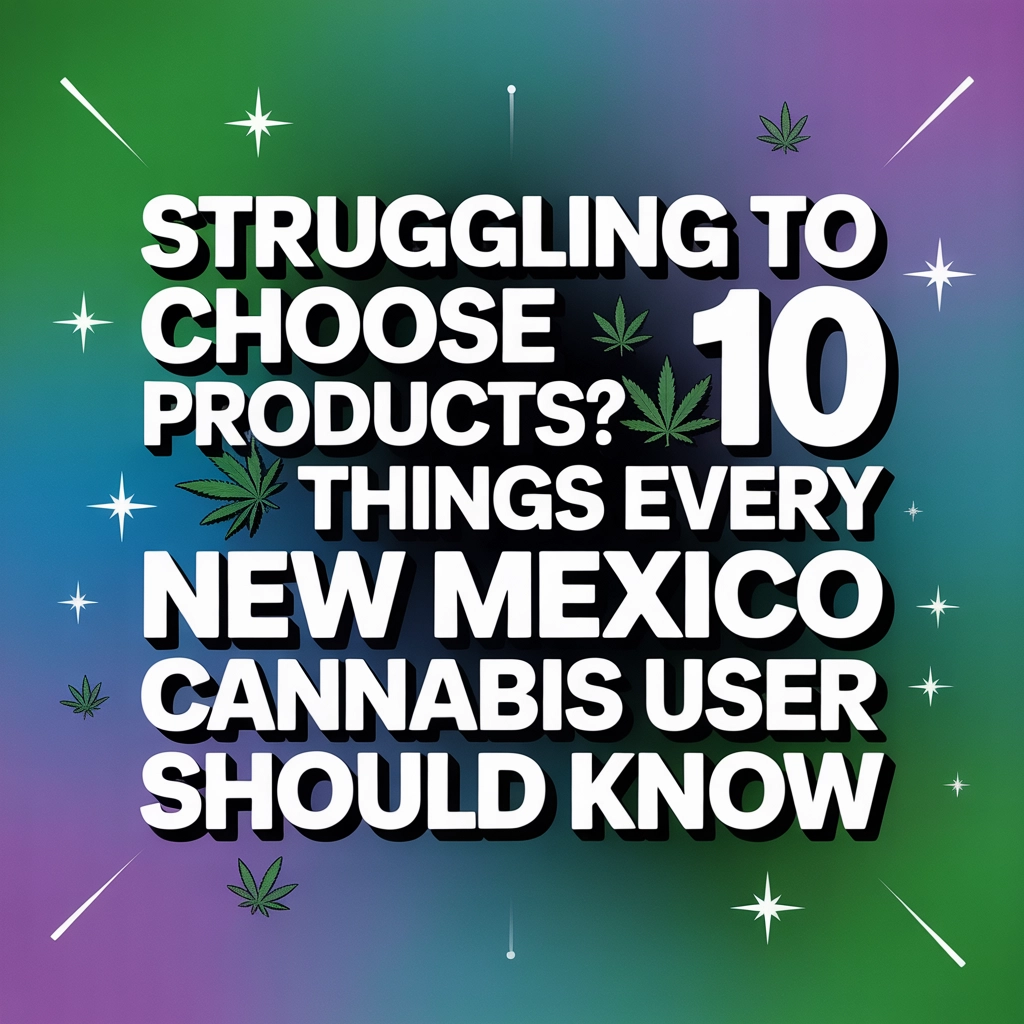Navigating the cannabis market in New Mexico requires comprehensive understanding of state regulations, product varieties, and consumption methods. The Cannabis Regulation Act established a unified framework for both medical and recreational cannabis, creating opportunities and obligations for consumers throughout the state. Understanding these fundamental aspects enables informed decision-making while maintaining compliance with established legal parameters.
1. Understand New Mexico's Legal Framework and Timeline
Cannabis achieved legal status in New Mexico when Governor Michelle Lujan Grisham signed the Cannabis Regulation Act on April 12, 2021. The first licensed recreational sales commenced on April 1, 2022, establishing New Mexico as a regulated adult-use cannabis market. The Cannabis Control Division oversees both adult-use and medical cannabis under one unified commercial framework, while the Department of Health continues managing the medical cannabis patient program. This dual-system approach creates distinct pathways for different user categories, each with specific benefits and requirements.
The legal framework establishes clear boundaries for possession, purchase, and consumption. Adults aged 21 and older can legally purchase and possess cannabis products from licensed dispensaries. The regulatory structure emphasizes consumer protection through mandatory testing, labeling requirements, and comprehensive tracking systems. Understanding this legal foundation prevents violations and ensures access to safe, regulated products.
2. Know Your Purchase and Possession Limits
Purchase limits in New Mexico differ significantly between recreational users and medical patients. Recreational users can purchase up to 2 ounces of cannabis at a time from licensed dispensaries. Medical patients possess expanded purchasing privileges, with eligibility to buy up to 15 ounces per 90-day period. These limits reflect the therapeutic needs of medical users while maintaining reasonable access for recreational consumers.
Possession limits extend beyond purchase restrictions. Public possession of more than 8 ounces becomes a felony offense, regardless of whether the cannabis was legally purchased. This distinction between purchase limits and possession limits requires careful planning for consumers who make frequent purchases. Understanding these boundaries prevents unintended legal violations and ensures compliance with state regulations.

3. Consider Tax Implications in Your Cannabis Budget
Tax structures significantly impact the total cost of cannabis purchases in New Mexico. Adult-use cannabis sales are subject to a 12% excise tax, which adds substantial cost to recreational purchases. Medical cannabis remains tax-free, creating significant savings opportunities for qualifying patients. This tax differential can represent hundreds of dollars in annual savings for regular cannabis users who obtain medical recommendations.
The excise tax applies to all adult-use cannabis products, including flower, edibles, concentrates, and accessories. Medical patients avoid this tax burden entirely, making medical cannabis programs financially advantageous for regular users. Calculating these tax implications helps consumers make informed decisions about medical versus recreational pathways.
4. Explore Home Cultivation Opportunities
Home cultivation rights provide additional access options for specific user categories in New Mexico. Registered medical marijuana patients with personal production licenses can grow up to 4 mature plants and 12 cannabis plant seedlings for personal use. Medical marijuana caregivers can also obtain personal production licenses to cultivate on behalf of registered patients. These cultivation rights offer long-term cost savings and product control for qualified individuals.
Cultivation regulations include specific requirements for security, plant limits, and location restrictions. Personal production licenses require separate applications and compliance with additional regulations. Home cultivation provides opportunities for customized growing methods, strain selection, and harvest timing that commercial products cannot match.
5. Navigate Strain Selection Based on Desired Effects
Cannabis strains produce varying effects that align with different therapeutic goals and recreational preferences. Strain selection impacts the overall cannabis experience through different cannabinoid and terpene profiles. Some strains may help reduce fatigue or enhance mood, while others promote relaxation and sleep. Understanding these differences allows consumers to select products that align with their desired experience and therapeutic goals.
Strain categories include indica, sativa, and hybrid varieties, each associated with different effect profiles. Indica strains typically produce relaxing, sedative effects suitable for evening use. Sativa strains generally provide energizing, uplifting effects appropriate for daytime consumption. Hybrid strains combine characteristics from both categories, offering balanced effects that suit various situations and preferences.

6. Choose Appropriate Consumption Methods
Consumption methods significantly influence the onset time, duration, and intensity of cannabis effects. Traditional smoking provides immediate onset with effects lasting 1-3 hours. Vaporizers offer a cleaner inhalation experience with similar onset times but potentially different flavor profiles. Edibles like cannabis-infused products provide longer-lasting effects with delayed onset, typically requiring 30 minutes to 2 hours for full effect development.
Each consumption method requires different dosing approaches and timing considerations. Inhalation methods allow for immediate dose titration, while edibles require patience and careful initial dosing. Concentrates and extracts offer potent options for experienced users seeking strong effects with smaller quantities. Understanding these differences prevents overconsumption and enhances the overall cannabis experience.
7. Stay Current with Regulatory Changes
New Mexico recently implemented emergency hemp rules effective September 1, 2025, that significantly impact the cannabis market. These rules ban the production of all semi-synthetic and synthetic cannabinoids and restrict their use in hemp products, though specific non-intoxicating variants remain allowed. Hemp facilities must now demonstrate that their ingredients are truly hemp-derived, affecting product availability and selection.
Regulatory changes continue shaping the cannabis landscape in New Mexico. These modifications affect product formulations, testing requirements, and compliance standards. Staying informed about regulatory updates ensures continued access to legal products and prevents inadvertent violations of changing requirements.
8. Verify Product Safety Through Track and Trace Systems
New Mexico uses BioTrack for its cannabis tracking system, ensuring product transparency from cultivation to sale. This system helps guarantee product safety and legal compliance by tracking every cannabis product through the supply chain. Licensed dispensaries participate in this tracking program, providing verification of product legitimacy and safety standards.
Track and trace systems create accountability throughout the cannabis supply chain. These systems verify that products undergo required testing for pesticides, heavy metals, microbials, and potency. Purchasing from licensed dispensaries that participate in tracking systems ensures access to tested, compliant products that meet state safety standards.
![]()
9. Evaluate Medical vs. Recreational Pathways
Medical cannabis registration offers several advantages over recreational purchases for qualifying patients. Medical patients receive higher purchase limits, tax-free purchases, and access to home cultivation rights. The Department of Health oversees medical cannabis patient registration separately from the recreational market, creating distinct application processes and requirements.
Medical cannabis programs require physician recommendations and state registration, but provide significant long-term benefits for regular users. Medical patients access specialized products, receive tax exemptions, and enjoy expanded legal protections. Evaluating eligibility for medical cannabis programs can provide substantial financial and legal advantages for appropriate candidates.
10. Prioritize Safety and Quality Assurance
Product safety depends on purchasing from licensed, compliant retailers that follow state regulations and testing requirements. Hemp manufacturers producing products for human consumption must comply with the Food Service Sanitation Act and New Mexico Food Act. Licensed dispensaries maintain detailed premise diagrams and follow strict regulatory requirements that ensure product quality and safety.
Quality assurance includes comprehensive testing for contaminants, accurate labeling of cannabinoid content, and proper storage conditions. Recent regulatory changes affecting synthetic cannabinoid products emphasize the importance of verified, naturally-derived cannabis products. Always verify product testing results and labeling accuracy before making purchases, particularly given evolving regulations affecting product formulations.
At Groth Industries, our knowledgeable staff provides guidance on product selection, consumption methods, and compliance requirements. Our commitment to education and transparency helps New Mexico cannabis users make informed decisions while navigating the evolving regulatory landscape. Contact us for personalized assistance with your cannabis product selection needs.

